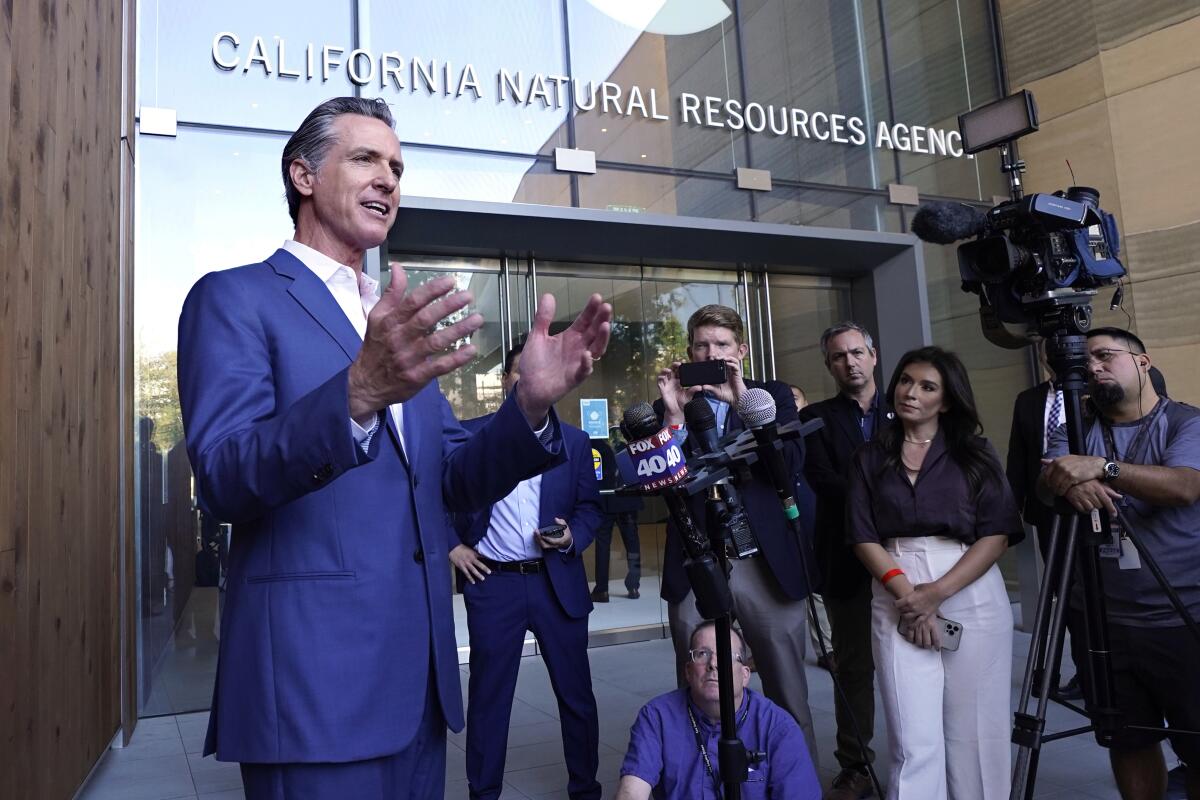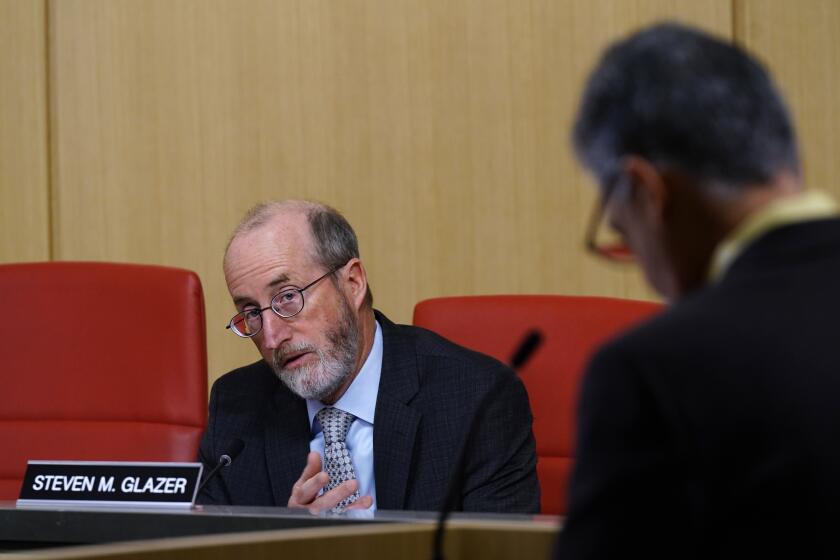Don’t let Big Tech monopolies kill local news. Democracy is at risk

- Share via
SACRAMENTO — It’s not the Harris honeymoon that’s bringing smiles to Democrats. It’s the Biden divorce. Voters are relieved. And they can largely thank the news media.
They can also credit themselves. Unhappy voters had been telling pollsters for months that President Biden was too old to run for reelection and serve a second term. But they were ignored by the president and Democratic leaders.
It was journalists — newspaper, digital and TV — who continually informed the public of Biden’s decline. Who else was going to lay it out straight? Certainly not the government — the White House or Democratic congressional leaders.
And when Biden, 81, performed pathetically in his June debate with Donald Trump, professional journalists did their job: They wrote about and showed the president’s deterioration. Editorial pages — most emphatically the New York Times — pushed hard for Biden to step aside.
That shook Democratic leaders. They finally grew the backbone to pressure Biden into quitting the race.
It’s a good bet this never would have happened if it weren’t for the independent free press performing as the Founders envisioned when they wrote the 1st Amendment. Biden sadly would still be the Democratic standard bearer, not Vice President Kamala Harris.
That’s a very high-profile example of robust journalism’s irreplaceable value to a healthy democracy. Weak journalism leads to a sick democracy. A functional democracy must be fueled by a reliable flow to citizens of credible information. The void created by the decline of factual journalism is filled by misinformation.
But the entire news reporting business is in perilous decline throughout the United States and much of the free world. In America, it’s happening particularly in small and medium size towns where there are always examples of some deteriorating politician needing to be pushed aside and corruption and incompetence are going unchecked.
Economic forces and new technology have dramatically reduced local reporting power. This series examines the crisis and California’s novel efforts to save local news.
Strong news coverage is vital to hold elected representatives accountable and conversely inform voters of their good deeds. But it has fallen precipitously in county seats and city halls throughout California. And at the state Capitol.
In the last 20 years, the size of the Capitol press corps — and The Times bureau — has shrunk by two-thirds.
Some of the reporting gap has been filled by a nonprofit, foundation-funded organization, CalMatters, that distributes its articles free to traditional news outfits. That’s a possible harbinger of the future and a way to help more regions avoid sinking into so-called news deserts.
Newspapers have been disappearing. Roughly a third — 2,500 — have closed shop across the country since 2005. All sizes. Most of those staying open have cut back severely. Roughly two-thirds of journalists have lost their jobs. More than 100 Times newsroom staffers were laid off in January.
It’s not only newspaper reporting that is shrinking. It’s also broadcast and digital.

The culprit: the big internet and social media platforms that grab news outlets’ work without paying for it and build their own ad programs around the heisted articles. Or they just seize the info and create their own posts. That’s the destructive future of AI.
Newspaper advertising has dried up. And increasingly because of the platforms’ manipulation, the revenue isn’t being replaced by internet ads.
At the Capitol, some Democratic legislators have been trying for two years to craft legislation to compel the largest internet platforms, such as Google, to kick in money to save journalism — to pay at least minimally for the articles they’ve been ripping off.
But time’s running out. The Legislature’s two-year session will end on Aug. 31.
The internet monopolies are fighting hard by pressuring lawmakers and running a barrage of disingenuous TV ads claiming that the Legislature wants to help giant hedge funds rather than local papers. Nonsense. Some papers and TV stations may be owned by large corporations and financiers, but they still cover local news.
The bill would tax Amazon, Meta and Google for the data they take from users and pump the money into news organizations in the form of tax credits.
Negotiations between legislators and internet lobbyists apparently have not progressed far. And Gov. Gavin Newsom remains silent.
There are two bills in play. Each has passed its own house and is stymied in the other.
AB 886, by Assemblywoman Buffy Wicks (D-Oakland), is patterned after laws enacted in Australia and Canada. It would require large platforms such as Google to pay news outfits for their products. Fees would be set by arbitration. At least 70% of the money would need to be spent on reporters.
SB 1327, by Sen. Steve Glazer (D-Orinda), would impose a California “data extraction fee” — a sales tax — on platforms that gross more than $2.5 billion annually from advertising to state residents. That would hit Google, Amazon and Meta and generate $1 billion annually. Half would fund partial tax credits for reporters’ salaries. An additional 40% would go to schools.
The platforms contend this would raise advertising rates.
Ridiculous, Glazer says: “It would do the opposite. They’re already getting the maximum rates they can. And it would increase advertising competition [from news outlets], driving down rates.”
“Tech platforms are getting clicks and profiting mightily off the hard work of journalists,” state Senate leader Mike McGuire (D-Healdsburg) said in a statement last week after Wicks’ bill squeezed through a key Senate committee. “These bills would work in tandem to help level the playing field.”
But there’s concern that the Legislature will pass a weak bill that essentially lets the internet monopolies off the hook by tapping them only lightly.
“That could cause harm to journalism rather than help,” says Matt Pearce, president of the Media Guild of the West, the news staffers’ union. “Whatever California does is going to set the pattern for the rest of the nation. We need serious regulation, not a pat on the head.”
Journalism isn’t ailing just locally. It’s a national epidemic. Twenty years from now, another declining president might not receive a strong enough push to step aside.
More to Read
Sign up for Essential California
The most important California stories and recommendations in your inbox every morning.
You may occasionally receive promotional content from the Los Angeles Times.













